PTM y COVID-19: recursos, directrices, eventos y preguntas
Esperamos que se encuentren bien en estos momentos de incertidumbre. Según sigue avanzando la pandemia del COVID-19 en todo el planeta, las comunidades de todo el mundo se verán afectadas de una manera u otra, ya sea directamente por el virus, o por sus consecuencias económicas o de otra índole.
A lo largo de la red de la CALP Network se ha debatido mucho sobre las implicaciones de la pandemia en los programas de transferencias monetarias (PTM) y en el trabajo de los miembros de la CALP.
Directrices y recursos
- Documento vivo de CALP Network con directrices para PTM en relación con el COVID (disponible en árabe, español y francés), que resume los puntos clave de las directrices ofrecidas por diferentes actores de la red y se actualiza con regularidad.
- Aquí pueden encontrar una colección de recursos (lista de referencia), aprendizajes y preguntas. Gracias por seguir compartiendo materiales.
- Abajo encontrarán otros recursos y enlaces útiles.
Últimos recursos

COVID-19: Invest now in cash/voucher-social protection scale-up or children pay the price later
Report
Read the article here. Only socially accountable Social Protection Assistance beyond humanitarian cash/voucher programmes – if properly and quickly implemented – will protect generations of children from the aftershocks of COVID-19. Despite cash and voucher transfers becoming the tool of choice of...

COVID-19 & Urgent Need for Child-Sensitive Social Protection
Policy paper
The COVID-19 pandemic is negatively affecting children’s lives in a myriad of ways. Well-intentioned government containment and response efforts such as movement restrictions and school closures have disrupted education for more than 1.5 billion students, leaving some of the most vulnerable children...

CVA & COVID-19: Remote Market Assessment and Monitoring
Blog Post
As field practitioners adapt their programmes to COVID-19, colleagues across our membership and Cash Working Groups are identifying multiple challenges. The CALP Network is working with others to develop a series of short, field-focused recommendations for such practitioners. The purpose of this series is...

Global Remittances to Suffer a Blow From COVID-19
Blog Post
The CALP Network’s Future of Financial Assistance report highlighted the importance for CVA actors of working with and alongside other financial flows, which often dwarf volumes of humanitarian aid in crisis contexts. Of these flows, remittances are a critical lifeline for many crisis-affected...

Frequently Asked Questions (FAQ) COVID-19 and Gender Aware Cash and Voucher Assistance (CVA) Programming
Policy paper
This FAQ is prepared for the CVA professional to build their technical capacity in relation to use of cash and voucher transfers across the sectors particularly under COVID-19 response.
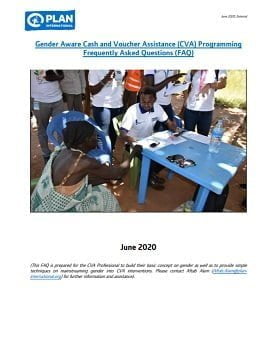
Gender Aware Cash and Voucher Assistance (CVA) Programming Frequently Asked Questions (FAQ)
Guidelines and Tools
This FAQ is prepared for the CVA Professional to build their basic concept on gender as well as to provide simple techniques on mainstreaming gender into CVA interventions. Please contact Aftab Alam (Aftab.Alam@plan-international.org) for further information and assistance.
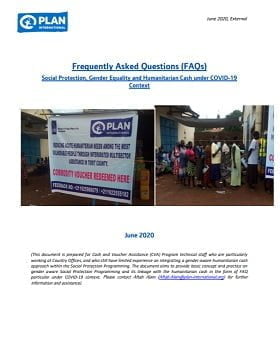
Frequently Asked Questions (FAQs) Social Protection, Gender Equality and Humanitarian Cash under COVID-19 Context
Guidelines and Tools
This document is prepared for Cash and Voucher Assistance (CVA) Program technical staff who are particularly working at Country Offices, and who still have limited experience on integrating a gender aware humanitarian cash approach within the Social Protection Programming. The document aims to provide...
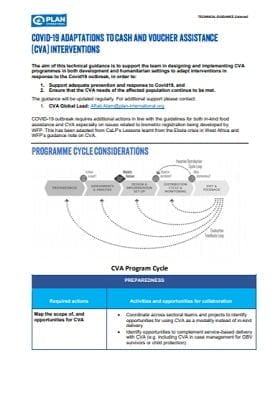
COVID-19 Adaptation to Cash and Voucher Assistance (CVA) Intervention
Guidelines and Tools
The aim of this technical guidance is to support the team in designing and implementing CVA programmes in both development and humanitarian settings to adapt interventions in response to the Covid19 outbreak, in order to:
1. Support adequate prevention and response to Covid19, and
2. Ensure that the CVA...

Why use cash transfers to respond to COVID-19?
Guidelines and Tools
It is a one pager document showing advantages of using cash transfers in COVID-19 response together with some examples of integrating cash with different sectors.

CVA for COVID-19: Listen to people and act on what they say
Blog Post
Not everyone will be personally affected by the COVID-19 health crisis, but nearly every household will feel its effects economically. For many people in humanitarian crises, particularly those at the margins of society, the economic impact of COVID-19 will be greater and longer-lasting than the health...

CVA & COVID-19: Adapting Delivery Mechanisms
Blog Post
As field practitioners adapt their programmes to COVID-19, colleagues across our membership and Cash Working Groups are identifying multiple challenges. The CALP Network is working with others to develop a series of short, field-focused recommendations for such practitioners. The purpose of this series is...

The Impact of The COVID-19 Development on Beneficiaries of Emergency Social Safety Net (ESSN) Program
Report
As of 19 April 2020, the Ministry of Health reported more than 86,000 confirmed COVID-19 cases with almost 2,000 deaths in Turkey. The Government of Turkey has introduced a series of containment
measures, including closing of schools, shopping malls and businesses; a curfew for individuals above 65 or...

So COVID-19, there’s an app for that…
Blog Post
In an earlier blog we explored the implications of COVID-19 adaptations in CVA response on an individuals’ right to privacy. We also argued that data portability in CVA could be explored as part of an opportunity to build back better. In this guest blog from Alesh Brown, founder at TrustWorks.io, we...
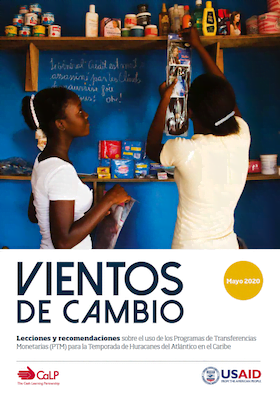
Vientos de Cambio: Lecciones y recomendaciones sobre el uso de los Programas de Transferencias Monetarias (PTM) para la Temporada de Huracanes del Atlántico en el Caribe
Informe
Esta nota informativa fue encargada por la red del la CALP Network para compilar evidencia sobre buenas prácticas y lecciones aprendidas, para generar recomendaciones para que los actores humanitarios y otras partes interesadas en la respuesta, tomen en cuenta al diseñar programas de transferencias...

Interim Guidance note on the role of Cash and Voucher Assistance to reduce financial barriers in the response to the COVID-19 pandemic, in contexts targeted by the Global Humanitarian Response Plan COVID-19
Guidelines and Tools
This paper provides general guidance on identifying financial barriers, and considering supply side financing options and complementary CVA within the broader response interventions to Covid-19.
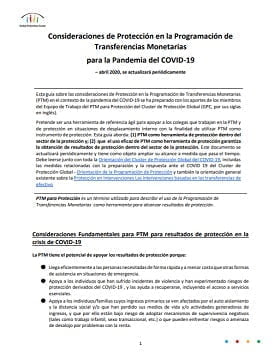
Consideraciones de Protección en la Programación de Transferencias Monetarias para la Pandemia del COVID-19
Guía y herramientas
Esta guía sobre las consideraciones de Protección en la Programación de Transferencias Monetarias (PTM) en el contexto de la pandemia del COVID-19 se ha preparado con los aportes de los miembros del Equipo de Trabajo del PTM para Protección del Cluster de Protección Global (GPC, por sus siglas en...
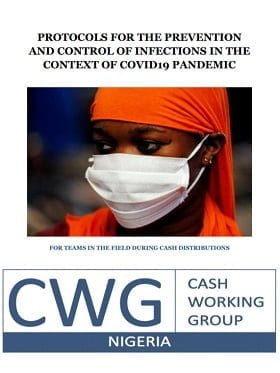
Protocol for the Prevention and Control of Infections in the Context of the COVID19 Pandemic
Guidelines and Tools

Cash Assistance and COVID-19, Emerging Field Practices II
Guidelines and Tools
This document is a follow up to the UNHCR Cash Assistance and COVID – 19 Emerging Field Practices and presents additional snapshots from the many innovative field practices on cash assistance in light of COVID-19. More than 65 UNHCR operations have now launched new cash initiatives and/or expanded...

La Importancia de Cumplir con los Compromisos del Gran Acuerdo para un Enfoque Significativo de Género en Respuestas con la Programación de Transferencias Monetarias a la Pandemia del Covid-19
Guía y herramientas
En el 2016, los líderes mundiales, las agencias de las Naciones Unidas (ONU) y las agencias humanitarias se unieron para mejorar la eficiencia y la eficacia de la acción humanitaria, lo que resultó en 51 compromisos conocidos como el Gran Acuerdo. La pandemia mundial del COVID-19 ya ha puesto de...

CVA response – COVID-19, privacy, carrots and open banking
Blog Post
Since the onset of COVID-19 pandemic, there has been heightened interest in the use of technology for humanitarian assistance provision, both to help fight the spread of the pandemic through a plethora of tracing apps, and to help reach people who have been worst hit economically with remote registration...


